Check out yesterday for part 1.
ALL GOLD CANYON
SUMMARY
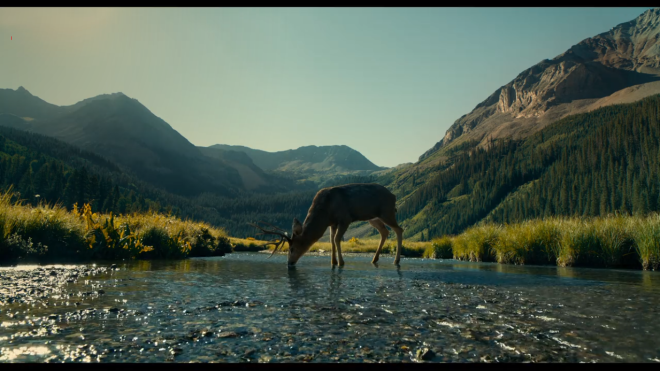
A grizzled Prospector (Tom “I’m also grizzled” Waits) makes his way along with his donkey to a beautiful valley with a river running through it. He begins to systematically hunt for gold, attempting to find the mother lode (yes, that’s the spelling), who he calls “Mr. Pocket.” For the most part, the story is just following the Prospector’s efforts as he works his way towards the goal. Eventually, he does find the pocket after digging a giant hole.
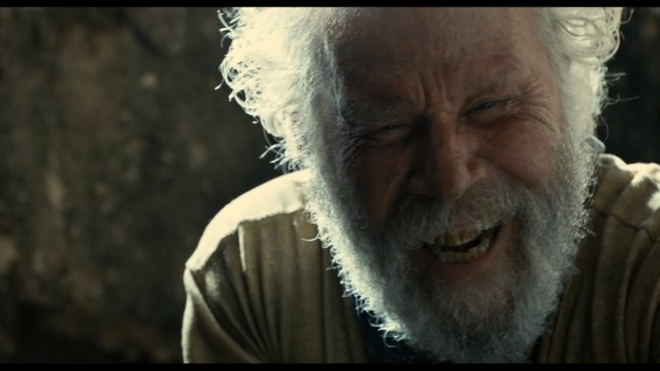
However, right as he uncovers it and celebrates, a shadow falls over him. It turns out that a Young Man (Sam Dillon) has been following the Prospector and waiting to jump his claim after he did all of the work. The Young Man shoots the older one then smokes a cigarette before jumping in the hole to move the body. However, the Prospector is revealed to be alive, wrestles the gun away from the Young Man and shoots him to death. At the end, the Prospector buries the Young Man in the hole as “his share” and then makes his way back to civilization with his bags of hard-won riches.
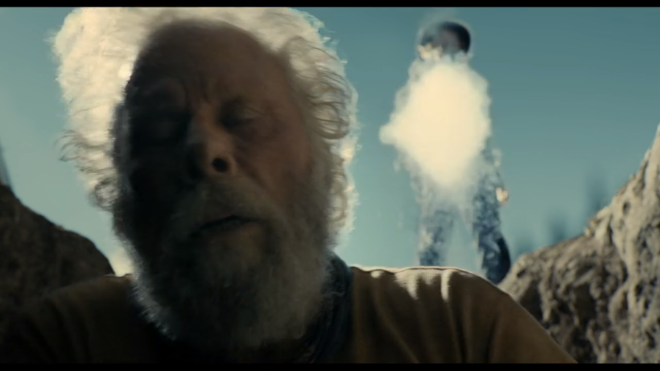
END SUMMARY
I’ve seen jokes online about the idea that Tom Waits wasn’t cast for this role, he just surreptitiously appeared out of a tumbleweed when the Coens were discussing the idea of having an elderly Prospector as the focus for a short. I completely believe that. He’s so perfect in this role that I’m not sure I can think of anyone else playing the character. Really, he’s the reason why this segment works at all, because it takes a hell of a performance to captivate an audience when you’re the only thing on screen.
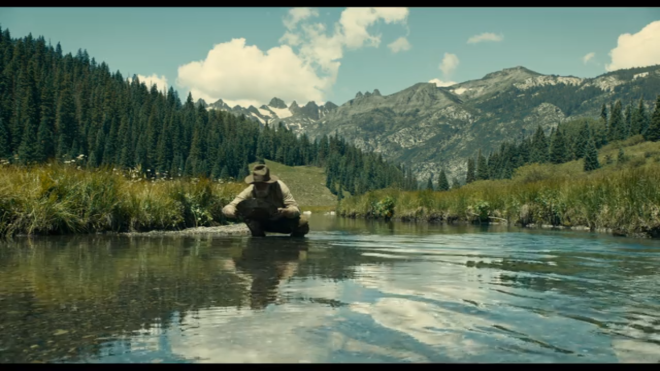
This is a Western story that’s usually the B-plot in a movie, because it’d be hard to make it into the focus. It’s the Gold Rush (which, while that is a movie, is not a Western). It’s the man out there betting his life on acquiring the fortune that he believes was owed to him. However, and perhaps all too realistically, when he’s done all the work, someone is there to just take it from him and render all of his efforts meaningless. This seems like a shot at the dark reality of the American Myth of Hard Work: Someone out there is always waiting to steal it.
THE GAL WHO GOT RATTLED
SUMMARY
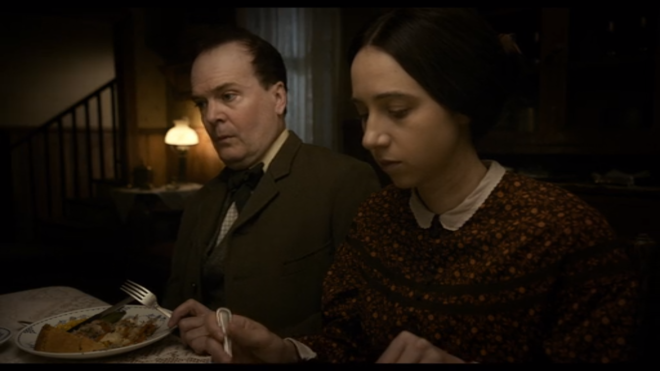
Alice Longabaugh (Zoe Kazan) and her brother Gilbert (Jefferson Mays) are setting off via a wagon train towards Oregon where Gilbert has arranged for Alice to be married to a business associate in exchange for employment opportunities. Shortly after they leave, however, Gilbert dies of Cholera, leaving Alice uncertain of what is going to happen when they get to Oregon. She soon discovers that they buried Gilbert with all of his money, leaving her no ability to pay the boy that Gilbert promised an exorbitant amount to drive the wagon. She seeks help from one of the wagon train’s leaders, Billy Knapp (Bill Heck), and his associate Mr. Arthur (Grainger Hines). Billy asks for time to contemplate the situation, but also agrees to help Alice by scaring off her brother’s annoying dog President Pierce who had been upsetting the other travelers.
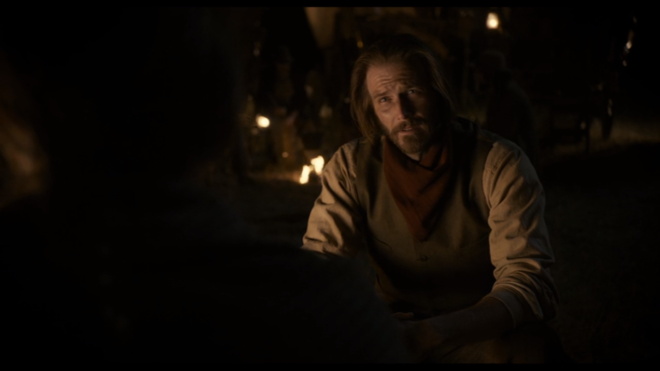
As Billy Knapp and Alice talk, they begin to grow fond of one another. Billy agrees to help Alice’s predicament by offering to marry her and assume Gilbert’s debt to the boy. She happily agrees. Billy informs Mr. Arthur that he plans to retire from leading wagon trains and will instead choose to farm in Oregon. Mr. Arthur seems unaffected by this. The next morning, Mr. Arthur cannot find Alice, so he rides off to find her watching over the returned President Pierce playing with some prairie dogs. Unfortunately, they’re immediately found by a Comanche scout and a raiding party is soon approaching the pair. Mr. Arthur thinks he can scare them off, but gives Alice a gun to kill herself in case the situation seems hopeless. Mr. Arthur successfully kills a number of the raiders, including the leader, but is hit by an attack from a hidden enemy at the very end, seemingly knocking him unconscious. He reveals this to be a ruse and shoots the last attacker, only to find that Alice, believing the attack killed Mr. Arthur, shot herself. He takes the dog back to the wagon train, observing Billy riding towards him, and has no idea what to tell Billy Knapp.
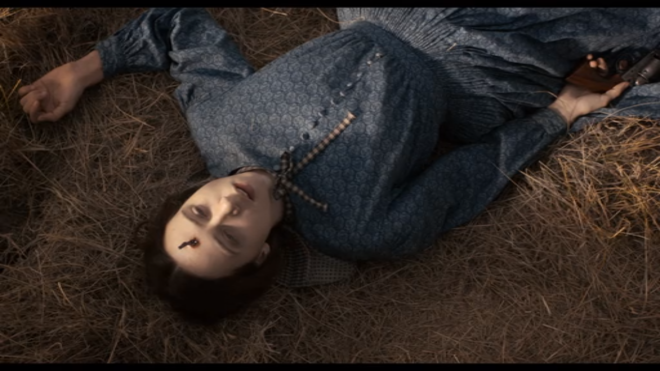
END SUMMARY
This is probably the most traditional Western in the series. It’s a love story told during a wagon train. Billy Knapp is the archetype of the hard-riding cowboy who still has the heart of a romantic. He’s not well-spoken, but he is extremely formal when addressing Alice. He doesn’t seem to talk with her much, but they both seem to recognize the subtext in what each one is saying, something that’s typical of romance in the Western genre. Hell, in Unforgiven, William Munn’s wife is dead for the entire time, but his speaking of her and her impact on his life completely conveys their love story.
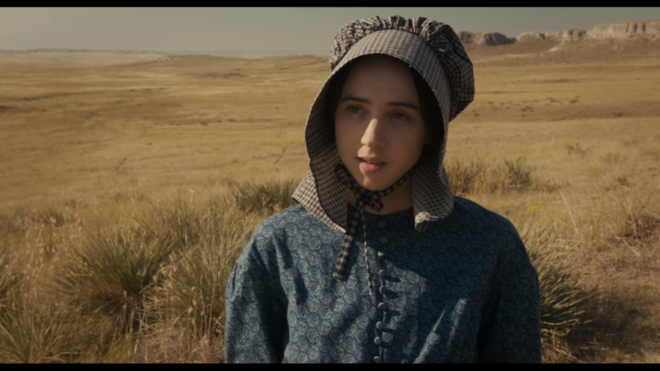
Mr. Arthur is the veteran trailblazer who doesn’t express his emotions. For the most part, he seems to not care about anything right up until the end, where he becomes despondent over the fact that Alice has killed herself. It’s not certain whether it’s the fact that her death was needless, or perhaps he blames himself, or if it’s the fact that his best friend has now lost the woman he loved, but he clearly is broken up over it. Given that the story explicitly states that he’s unsure of what he’s going to say to Billy Knapp, I’m inclined to say it’s the latter.
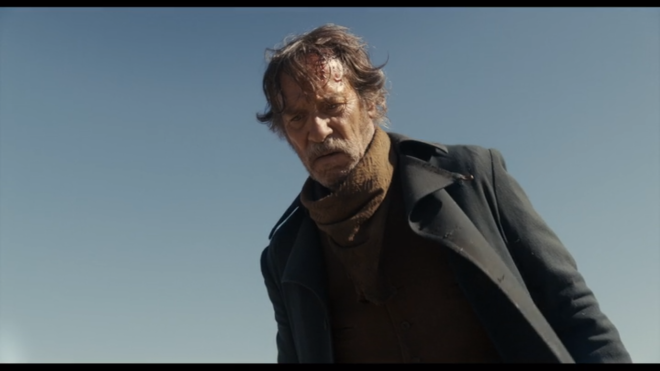
It’s really the insertion of some difficult reality into such a romantic story that provides the dark comedy, and it is very dark, element, though this probably has the fewest humorous points of any of the stories. Gilbert’s abrupt death is the most prominent example, dropping from cholera in a few hours. The cut used to show the suddenness is a comic beat, even though it’s later the source of drama. The ending, likewise, almost has a comedy rhythm to the revelation, delivering her death as a grim punchline to the situation. It’s pretty much the Coen Brothers’ wheelhouse.
THE MORTAL REMAINS
SUMMARY
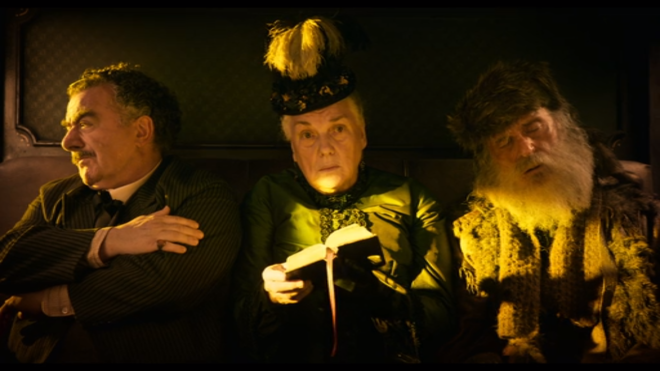
Five people are sharing a twilight coach ride together towards Fort Morgan, Colorado. They consist of René, a Frenchman (Saul Rubinek), Thigpen, an Englishman (Jonjo O’Neill), Clarence, an Irishman (Brendan Gleeson), Mrs. Betjeman (Tyne Daly), and an unnamed Trapper (Chelcie Ross). The five attempt conversation to pass the time, with Thigpen and Clarence saying that they often travel this route with “cargo,” implied to be dead bodies, one of which they have on the roof. For the others it’s their first time, with Mrs. Betjeman planning on reuniting with her husband at the destination.
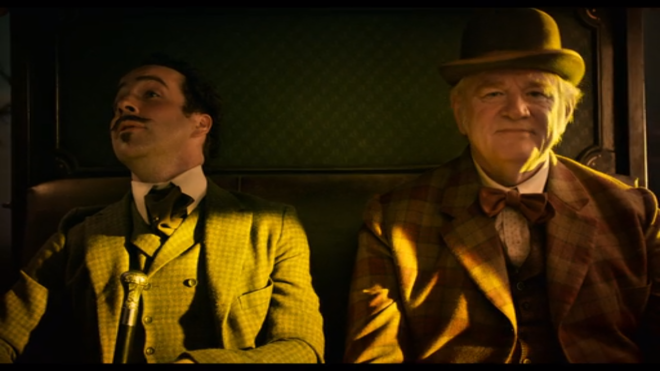
The Trapper, a boisterous man, starts to tell about his previous life with a Native American woman who didn’t speak his language, but with whom he still lived for several years based on body language and facial cues. The Trapper concludes that most people are alike in their needs, saying that humans are basically like ferrets or beavers, all the same everywhere. Everyone else starts to relay their philosophies on life. Mrs. Betjeman says that there are two kinds of people: Upright and sinning. René says that no person can know another, with everyone having to “play their own hand.” He also implies that she cannot know that her husband still loves her now, because she hasn’t seen him in 3 years. This renders her in an apoplectic state, but when René tries to stop the coach, the Coachman appears unable to hear him. Thigpen tells them that the Coachman never stops. To calm the mood, Clarence sings “The Unfortunate Rake.”
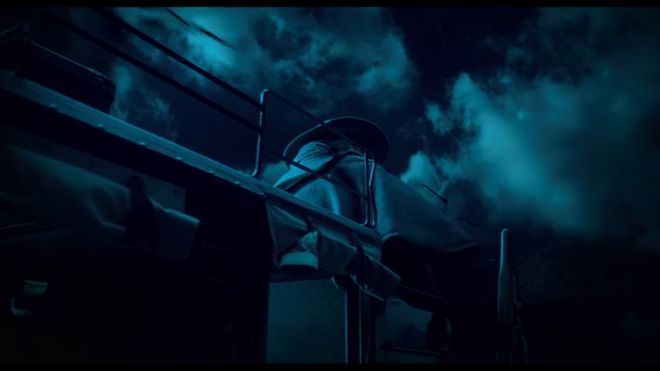
Thigpen and Clarence then reveal themselves to be Reapers, something that the Trapper interprets as being bounty hunters. Thigpen tells them that he distracts people with a song (as he was singing as the sun set) or a story and Clarence “thumps” them. He says that the key is that the people in the story are “us” but “not us.” He mentions loving watching the eyes of the dying as they try to work out how the whole thing works, but gives a seemingly insincere answer when asked if anyone ever works it out. They then arrive at Fort Morgan’s hotel, the Reapers entering immediately, the other three following cautiously. The Trapper and Mrs. Betjeman enters, the latter saying that her husband is waiting. René watches the coachman go out to pick up more passengers, looking beaten, before finally putting on his hat, accepting his fate, and entering the hotel. The story ends with the line “the Trapper, who had spoken so many words and for so long, no longer had use for them. He settled in for a long quiet.”
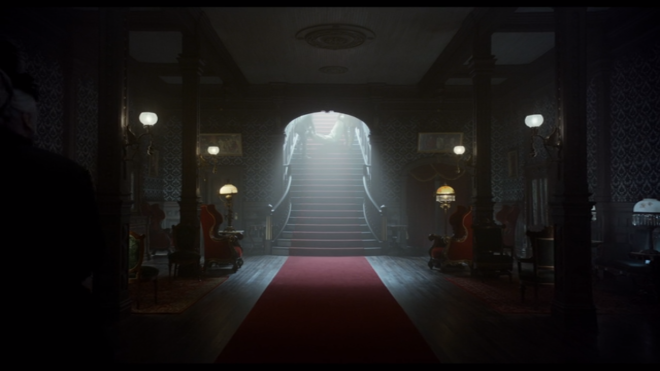
END SUMMARY
This is both the most allegorical story in the collection and also the one that’s most obviously expressive of the theme of the film.
At first, when there is light on the ride, it appears that this is just a group of people heading towards a destination. However, as darkness falls, it becomes apparent that these people aren’t heading for Fort Morgan at all. They’re all dead and heading for the afterlife. That’s what makes the conversations so important. Each of these people have a different point of view of the world: The Trapper thinks all people are alike, the lady thinks all people are either dedicated to virtue or damned, and the Frenchman thinks that no human can ever understand another. Despite this, they’re all going to the same place in the end. Death doesn’t care about your philosophy, it’s going to come and, like the Coachman, it’s never going to stop. You can do whatever you want to rationalize it, but it’s always how the story ends.
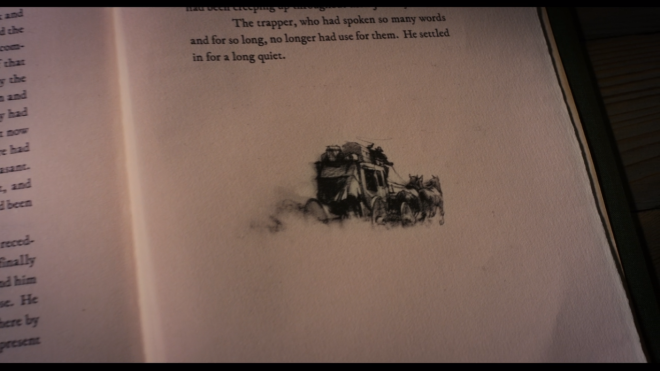
I think the most surprising part for me is Brendan Gleeson’s wonderful rendition of “The Unfortunate Rake.” It’s probably better known as the Country Folk Song “Streets of Laredo,” which has been covered dozens of times, but that’s sort of the point of the song. The story changes over time with each player and each singer, but the ending is always the same. That said, I think that the version Gleeson sings, which is about a man dying from getting an STD from a woman and regretting that he hadn’t listened to his father about how his wicked behaviors would cut him down in his prime, was an interesting choice. I imagine they chose it because it’s a particularly tragic and, by modern sensibilities, unearned death.
FILM ANALYSIS
It’s about Death.
In every story, the main character is someone who is dead but doesn’t realize it yet. Buster says he should have seen it coming because he tried to stay top dog and invited challenge. The Cowboy in “Near Algodones” was doomed to be hanged, even if he managed to avoid the first noose. Harrison had been saved from death by the Impresario when he was younger, only for that same man to later revoke that gift. The Prospector should have died, but it turns out that when the Young Man jumped his claim, he apparently claimed his death for his own. Alice Longabaugh sadly was doomed never to find a husband, whether it be the one her brother chose or the one she chose herself. Each of the characters in the coach is already dead, only realizing it part of the way during the journey (although the Trapper might not have really grasped it until the very end).
The Western setting for each story works because a huge part of the myth (and reality) of the West is that it was filled with death and danger. In these stories we have death due to duel, we have death by execution, death by murder, death by suicide, and… well, just death. The West is filled with the stuff. Think about how many people John Wayne killed and he was a hero. Death was just an accepted risk there. That’s why it’s so much easier for the Coens to make a comedy about death among that setting. They also were able to present so many more variants around a common theme because that’s what we do with Westerns.
I’ve actually had to re-think things while writing this, so my ranking of the segments has probably changed as I went. Ultimately, I think I’d put them like this:
-
The Ballad of Buster Scruggs
-
All Gold Canyon
-
The Mortal Remains
-
Near Algodones
-
The Gal Who Got Rattled
-
Meal Ticket
That being said, all of these shorts are excellent and I applaud Netflix for giving the Coens the opportunity to try this kind of movie. I don’t know if this is the best Coen Brothers movie (actually, I do know, it’s not), but it’s definitely a great film.
If you want to check out some more by the Joker on the Sofa, check out the 100 Greatest TV Episodes of All Time, Collection of TV Episodes, Collection of Movie Reviews, or the Joker on the Sofa Reviews.
If you enjoy these, please, like, share, tell your friends, like the Facebook page (https://www.facebook.com/JokerOnTheSofa/), follow on Twitter @JokerOnTheSofa, and just generally give me a little bump. I’m not getting paid, but I like to get feedback.

